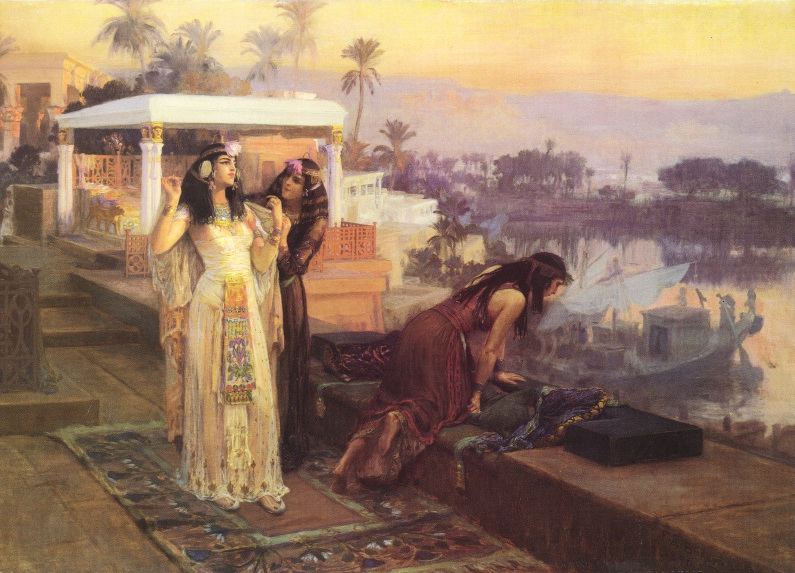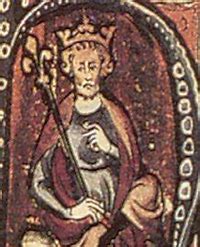Winner of the Fall 2017 StMU History Media Award for
Best Article in the Category of “Political History”
Everyone can recall the famous words “‘Till Death Do Us Part.” For most, such vows are given at the beginning of a marriage that anticipates a long and happy life together. However, in the case Cleopatra and Mark Antony, it was a completely different story. Their marriage was brief and they had far less time together than they most likely wanted to have.
From the very beginning, Cleopatra was smart, cunning, witty, and independent, and most of all she was a natural leader. She knew how to get things done, and as the Queen of Egypt, this was a crucial skill to have. She also knew what to do in order to gain what she wanted. Of course, when it came to Antony, it was no different. Antony was a Roman politician and general, and Cleopatra knew that she wanted him and she knew just how to get him.

Cleopatra and Antony met in 42 B.C.E., shortly after the death of Julius Caesar, who was also a former lover of Cleopatra. Not too long after Caesar’s death, many Romans started to suspect that Cleopatra had played a role in Caesar’s death, and among them was Antony. Being overly suspicious of her, Antony demanded to have a meeting with Cleopatra, and although she agreed to meet with him, she was making plans of her own on the side. When Cleopatra arrived in Tarsus, she came on a perfumed ship decorated with purple sails, she dressed as Venus, the goddess of love, and she welcomed Antony as Bacchus, the Roman god of wine. Cleopatra “played him like an instrument,” so much that she was able to persuade him to come to her quarters for a feast.1 Cleopatra did things how she wanted to, and a prime example was her meeting with Antony. Soon after this encounter, Antony became completely taken by her; he was “amazed at Cleopatra’s wit as well as her good looks, and became her captive” as though he was a young boy in love.2 Not too long after, they became lovers. By that time, however, Antony had become the joint ruler of the Roman Empire, and his co-ruler, Octavian, was out to get him.3
Cleopatra and Antony, now lovers, were very open about their relationship. The two did not try to cover up or deny their relationship. Cleopatra invited Antony to banquets, whether it was political or not, and they both liked to play around with each other, even making bets about silly things. In one case, Cleopatra told Antony that she could spend 10,000,000 sesterces on a single banquet, which was an enormous sum. Curious, Antony wanted to see how she could possibly do it. He was skeptical about it, so he decided to bet that she could not do it. The next day, Cleopatra set before him a fine banquet. As the last course was being served, the servants put before her a single vessel with vinegar, making Antony even more curious as to what on earth she would do. She took a pearl earring and dropped it into the vinegar, and when it was completely melted, she swallowed it. Plancus, who was umpiring the bet, declared that Antony had lost the bet.4 Cleopatra loved to show off and prove just how smart and cunning she could really be. After losing the bet, Antony could not help but be even more captivated by Cleopatra, especially because of her brains. With every little thing that she did, when she showed him her smarts and cunning abilities, he grew more and more in infatuated with her.

By 40 B.C.E., while their relationship progressed, Octavian was making plans to destroy Antony. In order to give him another reason for hating Antony, Octavian was making an arrangement that he knew Antony would mess up. Octavian arranged for his sister, Octavia, to marry Antony. This supposedly would create a better bond between the two rulers, but Octavian knew that Antony would end up leaving Octavia for Cleopatra. In fact, he counted on it.5 And Antony did marry Octavia, but it was only for the sake of saving his relationship with Octavian. He really wanted to make it work so as not to have a war in the future. However, his efforts did not pay off, and when Octavia bore a girl from Antony, Cleopatra bore twins from him as well. In 32 B.C.E., Antony ended up leaving Octavia after all, choosing to be with Cleopatra. Octavian knew that Antony would eventually leave his sister, and everything seemed to be working according to his plan.
When Antony left Octavia, he went to Cleopatra, and they continued their romance in public, both of them free from any other romantic entanglements.6 They lived together, and they even had children together. They eventually even went on to become married, although some scholars dispute this, such as Sheila Ager. But there is no doubt that they lived as though they were married. In the words of the classical scholar Ager, Antony treated Cleopatra, “with whom he had long been madly in love…as his wife.”7 In any relationship, it is natural to bear children, and in the case of Antony and Cleopatra, it was no different. The couple had three children in total together, their names being Cleopatra Selene II, Alexander Helios, and Ptolemy Philadelphus. Antony even ended up giving the throne of Armenia to his son Alexander Helios.8

Their happiness did not last long, however, due to Octavian’s wrath and power. Octavian realized the extent of influence that Cleopatra held over Antony, and he used that fully to his advantage.9 He was still trying to steal the power that Antony had, and he began to put a new plan in motion that would lead to a war and ultimately, to the demise of the two lovers. Octavian produced a document that many scholars now believe to have been a forgery. Octavian claimed that the document was Antony’s will. It stated that, in the event of Antony’s death, he would leave his part of Rome’s possessions in Cleopatra’s hands. Of course, when the Roman Senate heard this, they became outraged and declared war against both Antony and Cleopatra.10
In an attempt to win the war against Octavian, Antony took his forces to meet Octavian’s. The Battle of Actium then took place in 31 B.C.E. Antony was supported fully by Cleopatra. However, they lost the battle and the two lovers were forced to flee to Alexandria, Egypt.11 Eventually, despite all of their efforts, Octavian’s troops caught up with them in Alexandria. But Antony decided that he did not want to surrender, be captured, or be killed by Octavian’s troops, and that he would rather die his own way on his own terms. He ended up stabbing himself with his sword, committing suicide.

However, Cleopatra was captured by Octavian, who was planning to take her back to Rome as his prisoner. Cleopatra, being the strong-willed woman that she was, had other plans than to become a slave to Octavian, so she made arrangements for her own suicide. She had an asp, a snake with poisonous venom, “carried in to her with the figs and lay hidden under the leaves in the basket.”12 Once she had the asp, she clutched the hissing snake, mouth wide open, fangs visible, and then she pressed it to her breast, her throat muscles contracted in a vicious spasm, and eventually she died from the bite.13
Their romance may not have been long, only lasting from 42 to 31 B.C.E., It may not have been the type that everyone dreams of, and all of the events that occurred during their time together, especially at the Battle of Actium, may have led to their deaths. But it was a strong romance nonetheless.14 Cleopatra and Antony are remembered as a couple, “perhaps the most famous lovers from history.”15 The two lover’s tales are still told to this day and will continue to be told for generations to come.
- Ancient Civilizations Reference Library, 2000, s.v. “Cleopatra,” by Judson Knight and Stacy A. McConnell. ↵
- Appian, The Civil Wars (Penguin Classics, 1996), 391. ↵
- Ancient Civilizations Reference Library, 2000, s.v. “Cleopatra,” by Judson Knight and Stacy A. McConnell. ↵
- Pliny the Younger, Pliny the Younger to Laberius, c. AD 95, in Cleopatra. ↵
- Ancient Civilizations Reference Library, 2000, s.v. “Cleopatra,” by Judson Knight and Stacy A. McConnell. ↵
- Sheila L. Ager, “Marriage or Mirage? The Phantom Wedding of Cleopatra and Antony,” Classical Philology 108, no. 2 (April 2013): 141. Ager writes: “No one disputes the existence of the private relationship between Antony and Cleopatra.” ↵
- Sheila L. Ager, “Marriage or Mirage? The Phantom Wedding of Cleopatra and Antony,” Classical Philology 108, no. 2 (April 2013): 144. ↵
- Sheila L. Ager, “Marriage or Mirage? The Phantom Wedding of Cleopatra and Antony,” Classical Philology 108, no. 2 (April 2013): 144. ↵
- Encyclopedia Judaica, 2007, s.v. “Cleopatra,” by Michael Berenbaum and Fred Skolnik. ↵
- Ancient Civilizations Reference Library, 2000, s.v. “Cleopatra,” by Judson Knight and Stacy A. McConnell. ↵
- John Simkin, “Cleopatra,” Spartacus Educational, last modified August 2014. ↵
- Plutarch, Plutarch’s Lives: Life of Mark Antony (CreateSpace Independent Publishing Platform, 1920). ↵
- Pat Brown, The murder of Cleopatra: history’s greatest cold case (Amherst, New York: Prometheus Books, 2013), 32. ↵
- Thomas Burgon, “Observations on a coin of Cleopatra and M. Antony,” The Numismatic Chronicle 1, no. 1 (April 1839): 200. ↵
- Adrian Goldsworthy, Antony and Cleopatra (Yale University Press, 2010), 1. ↵



106 comments
Luisa Ortiz
Cleopatra and Mark Anthony this couple just won my heart. There is so much drama, story, love, with these two, I really enjoyed reading this article! I did not know about their games (the bets). I like the words that this writer used to describe Cleopatra, and how the story is being told almost like a movie! Good job on this piece!
Kathyleen Lauriano
Romantic stories are my favorite to read. Their romance truly was something fascinating. The fact that Antony left Octavia for Cleopatra shows that he truly loved her and they would be inseparable. I don’t like how Octavian had to go and ruin things for them out of jealously of their power. I feel like if he wouldn’t have done that some things would have been really different.
Christopher Hohman
nice article. I really enjoyed it. Antony and Cleopatra are definitely some of history’s most fascinating characters. Their love story is captivating. I hope to be writing an article on the battle of Actium this semester, so my article will be telling a somewhat similar story. I wonder how history might have been different if Cleopatra and Antony had won at Actium instead of Octavian. There is no way of knowing ofr sure, but I do not think that Rome would have accepted Antony as their ruler
Tyanne Pearcy
I love reading about intense, chaotic love stories, so this article definitely caught my attention. The journey of Antony and Cleopatra getting together seemed complicated and almost as if it wasn’t meant to be. Cleopatra seemed like a women who went after what she wanted without asking question and I feel like she choose Antony. Even though Octavian made it difficult for this pair to come together, they seemed as though they really cared for one another and made it work.
Esperanza Rojas
Truthfully, I never heard of the romance between Antony and Cleopatra, only of Cleopatra’s impact of being a female ruler, and this was why I chose to read this article. It was very interesting to hear how these two lovers were so madly in love each other, so much that one left a marriage that could ultimately benefit him, and his empire, for Cleopatra. Their story was so endearing to read, and I felt pride when I read that Cleopatra was strong and witty enough to find an escape plan when she was caught. Also, the drama in this story is well built up and gives it the effect of a true tragic tale of two lovers.
Dylan Sanchez
I loved reading this. If you think about it, based off this passage, Antony and Cleopatra were just 2 normal people in love and put politics aside when it came to their love life. However, I wonder if Cleopatra INITIALLY got with Antony for political power, for she was proclaimed as strongly independent and smart. But from what I read, it seems to be that they did end up loving each other and had their love life foiled by mean Octavian.
Annissa Noblejas
The story of Cleopatra and Anthony is a classic historical example of a woman’s ability to seduce and manipulate, as well as a man’s capability to exploit another’s happiness to ruin him. Cleopatra wanted Antony’s protection. Octavian wanted Antony dead. Octavian was keen to the irresistible pull between two people in love and exploited to his full advantage. Not only a love story between two rulers, but a cautionary tale against flaunting potential weaknesses.
John Smith
Wow, I just want to start off saying that the writing in this article is just as good as the story it told. It’s a shame that politics got in the way of love, but isn’t that how it always is? It does, however, make me happy that they had a least a decade under their belt. Who knows, maybe if they were to have lived they could’ve been the couple to last the centuries, that said it was probably their deaths that made them so memorable.
Natalia Flores
The romance between Cleopatra and Anthony is one that really stands out since they loved each other not just physically, but also for each others wit and cunning skill. Cleopatra, being a strong willed and independent, makes me wonder if she truly loved him or if it was a power play. Either way, Anthony feel in love with her to the point that he would jeopardize his position as one of the generals of Rome and put himself in a vulnerable position. Their story ended sadly and even though it was short, it seemed worthwhile.
Maria Esquivel
Wow! This was a great story from start to finish, I was captivated throughout the whole article. I have heard of Cleopatra and her brilliant mind, but not about Antony. I found their relationship endearing but also awkward because of Antony’s marriage to another woman. Even though the marriage was supposed to create a better bond between the two rulers. Overall, I really enjoyed reading about Cleopatra and Antony’s love story.